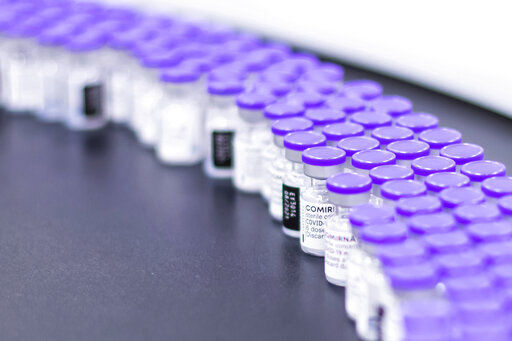“Eissenberg: Why a booster might be necessary,” Assistant Professor of Internal Medicine, Washington University, Linda Eissenberg, St. Louis Post-Dispatch, August 26, 2021. Professor Linda Eissenberg has spent over two decades studying microbial pathogens and has worked over 13 years on immunotherapies for cancer. _____________ Even people who were vaccinated are expressing anxiety these days, wondering whether they’ll be protected from the delta variant. Most likely yes, if it involved any of the three vaccines available in the U.S. Every one of them, Pfizer, Moderna, and Johnson and Johnson, make the chance of dying from the coronavirus, or even going into the hospital, much lower. But some vaccine recipients might still be worried
Topics:
run75441 considers the following as important: covid vaccination, COVID-19, Education, Healthcare, Hot Topics
This could be interesting, too:
NewDealdemocrat writes JOLTS revisions from Yesterday’s Report
Joel Eissenberg writes No Invading Allies Act
Bill Haskell writes Families Struggle Paying for Child Care While Working
NewDealdemocrat writes January JOLTS report: monthly increases, but significant downward revisions to 2024
“Eissenberg: Why a booster might be necessary,” Assistant Professor of Internal Medicine, Washington University, Linda Eissenberg, St. Louis Post-Dispatch, August 26, 2021.
Professor Linda Eissenberg has spent over two decades studying microbial pathogens and has worked over 13 years on immunotherapies for cancer.
_____________

Even people who were vaccinated are expressing anxiety these days, wondering whether they’ll be protected from the delta variant. Most likely yes, if it involved any of the three vaccines available in the U.S. Every one of them, Pfizer, Moderna, and Johnson and Johnson, make the chance of dying from the coronavirus, or even going into the hospital, much lower.
But some vaccine recipients might still be worried because they’ve heard mRNA vaccine immunity wanes. This story is still evolving, but it’s common for circulating antibody levels against any microbe to drop over time. It’s also common for cells that make specific antibodies to remain in the body long term, often hanging out peacefully until re-exposure causes them to ratchet-up antibody production. Likewise, specialized immune cells, called T cells, can lurk around in low numbers ready to nab the virus and amp up the immune system. These cells are harder to detect than antibodies, so the story’s not clear cut.
Nonetheless, the Centers for Disease Control and Prevention is recommending that people who got an mRNA vaccine but who didn’t respond strongly should get a booster shot now. Who are those people? Those who had been treated with immune-suppressing drugs for something like cancer or an autoimmune disease recently are among the candidates. Now’s the time for them to get the booster.
What about those who got the J&J vaccine? They only got one shot to start with, unlike the two-shot process required for the Moderna and Pfizer vaccines. Now some J&J recipients might be thinking something’s wrong here. After all, there was that blood-clot scare early on when they stopped giving the J&J vaccine for a while. The fact that the Food and Drug Administration swiftly put a hold on the emergency-use authorization should reassure you as to how carefully the FDA works to protect people. Such holds are not unusual in clinical trials.
The hold happened after only six people had clots out of more than 6 million people vaccinated. Only when the FDA was convinced by rigorous examination of those specific cases did it reinstate the authorization. Like the other two, the J&J vaccine is remarkably effective and minimizes recipients’ chance of dying from infection by the delta variant.
Why is it taking so long to find out whether a J&J booster is necessary? Remember that the J&J vaccine entered clinical trials later than the other two. But on Wednesday, a very small study suggested that a booster given at six months increased the amount of antibody in those getting the J&J vaccine by nine times what it was a month after getting the original dose.
Those who have been waiting for the FDA to actually approve a vaccine before getting the shot are now in luck: The Pfizer vaccine was fully approved on Monday, and the other vaccines are in the non-emergency approval pipeline.
Some people were hesitant because of how fast mRNA vaccines were developed. The speed was the result of a chance conversion of factors. First, the new nanoparticle technology that protects and delivers the mRNA was just being perfected. Second, the spike protein of a highly related coronavirus that causes Severe Acute Respiratory Syndrome, or SARS, had been identified as key for infection. Third, government funding jump-started the manufacturing and testing. Finally, there was so much of the coronavirus going around that it didn’t take long to tell that the number of people getting severe infections was much lower in the vaccinated group than in the placebo group.
Bottom line: Once people have gotten any of these vaccines, they are much less likely to be hospitalized or die from the coronavirus. If unvaccinated people want to be vaccinated after all, or if folks are interested in a booster, they should check with their doctor’s office or pharmacy, go to vaccines.gov, or call or visit their local library for help. Keep social distancing and following mask guidelines. But don’t be nervous. Be vaccinated.
